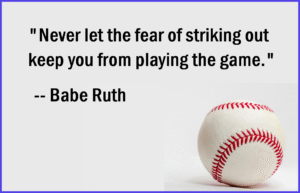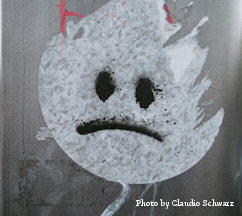
* * *
Babe Ruth played professional baseball for 22 years (1914-1935) and is considered one of the greatest players who ever lived. He had almost 3,000 hits in his career, averaging more than one hit per game. For many years, he held the record for the number of home runs hit during a single season (60 in 1927). His total number of home runs over his professional career was 714, a record which stood until 1974.
But there’s another statistic you may not have known: Babe Ruth struck out 1,330 times. Apparently, he never let the fear of failure keep him from playing the game.
* * *
Fear is part of being human. It goes along with the DNA, and it can be healthy because it instills the instinct for survival we all need. But fears can be unhealthy if we give in to them and become more cautious than we need to be.
Once we let our fears control us, things can get out of hand. A phobia is defined as an irrational fear of something that causes anxiety when a person is exposed to that particular thing.
We all know about fear of heights (acrophobia) and fear of spiders (arachnophobia), but when I searched around for a complete list, I found more than one hundred things on healthline.com to be afraid of! Here are a few I found interesting.
Fear of flowers (anthophobia) – Better not go for a walk in my neighborhood.

Fear of numbers (arithmophobia) – I have a friend who insists she “can’t do numbers”

Fear of books (bibliophobia) – Oh no!

Fear of failure (atychiphobia) – Ah, now here’s one we can relate to.

* * *
Failure is something we all experience, but I suspect the fear of failure is more acute in disciplines that require creativity than in other areas. The very word “create” implies something new, and that means it may not work.
I’ve read research that shows high achievers are very likely to experience fear of failure. (I imagine some of us here at TKZ fall into this category.) Having achieved success in their professional lives, these folks see anything less than a fabulous accomplishment as inadequacy.
Many high achievers will work hard to avoid that stigma, but others would rather drop out of the race than risk what they perceive as failure.
So how do authors stay in the game and handle that scary thought that they won’t be able to write another book as good as the last one? There are ways to minimize those concerns. According to an article on betterhealth.vic.gov.au, the same things that enhance creativity can be used to fight the fear of failure.
“There are several ways you can try to fight your fears.… Simple changes, like exercising regularly, can reduce your stress levels. So can eating healthy meals, getting enough sleep, and reducing or avoiding stimulants like caffeine and alcohol.”
And don’t forget the Babe. You can’t hit a home run if you don’t step up to the plate.

So TKZers: Do you experience a fear of failure in your writing? How do you fight it?
* * *

The saga continues with Knights in Manhattan, the second novel in the Reen & Joanie Detective Agency middle grade mystery series.
- Joanie is afraid of flying.
- Reen is afraid she might not catch the thieves.
- Mrs. Toussaint isn’t afraid of anything.
Join the fun with the R&J Detective Agency as they track down nefarious crooks in Manhattan. New York will never be the same.
$1.99 on Amazon, Barnes & Noble, Kobo, Apple Books, and Google Play

For me, it’s more a fear of “failing the idea” (if that makes any sense):
▪️I’ll have a plot idea that intrigues me, but I don’t want to “waste it” on poorly executed or overworked drafts – and so it sits and “percolates” – and haunts me almost to abstraction…
▪️Similarly, I’ll hear or read something that speaks to me as potential for a song or poem, I’ll scrawl a line or two or perhaps even a complete verse or chorus… and it remains in the jotted-down stage…
Combine this with a dose of imposter syndrome – the initial “wordsmithing” seems to come relatively easy for me – and as a result none of this feels like work, and if it’s “not work,” how can it measure up to the efforts of others who labor at it, let alone focus on it when there are other things that “need” being done?
Add a dash of perfectionism and “voila” – the perfect recipe for stooging and stalling and procrastinating…
What I have to force myself to remember is that the drafts aren’t meant for anyone but me…
…but what if someone later on finds my piddling and scribbling and discovers I’m not as talented as I want to be?
Or, humility forbid, as I think I am?
…that I WAS just “wasting time” (in THEIR minds anyway…)?
…and so that circle of “craft something worthwhile the first time” repeats itself…
I s’pose I am my harshest critic, after all…
…and who can live up to the opinion of someone who knows me that well… (or thinks I do)?
Good morning, George. You describe (very nicely) the situation so many of us find ourselves in. Perfectionism, imposter syndrome, fear of completing a work because it may not live up to the beginnings. Lots to worry about on our way to home plate.
“I s’pose I am my harshest critic, after all…” Well said. There are two sides to that coin.
George, I so identify with what you said about fear of failing the idea and things sitting and percolating.
If I allow it to, an idea will sit and percolate forever! – Brenda
I have doubts along the way, but I can’t say that I’ve ever felt fear while writing. Frustration would be a better emotion. When I can’t think of a way to have something happen that I want/need to happen to the characters for the story, but that’s usually overcome by research or thinking. When I think I’ll never get the book finished. When I finish the book and have to give it the editing pass before it goes to my editor (where I am now), but I’m not afraid.
Perhaps it’s because my writing isn’t putting food on the table, but I write primarily for me. Some of my books do better than others. Am I afraid people won’t like it? I think about all the best sellers with a bazillion 5-star reviews that I didn’t like.
Great attitude, Terry. It’s easy to cross the line between frustration and fear, but it sounds like you’ve found a way to stay on the right side.
After so many years, I still get a little knot in my stomach when one of my masterpieces is rejected. I console myself with this little bit of advice from an editor: “Sometimes we accept so-so pieces that happen to fit the available space. Sometimes we reject great pieces that are too similar to pieces we’ve already accepted. So don’t get too pumped about an acceptance, or too down about a rejection.” In this business, a little stoicism goes a long way.
Good morning, Mike.
After putting so much of ourselves in writing, it would be strange *not* to feel bad about rejection. It helps to have the perspective of the editor you quote.
Stoicism – the writer’s friend. 🙂
This is most likely due to past (and unfortunately, even present!) professions, but I have a fear of getting stuck in a process with no access to necessary assistance (programs with hard edits, logic loops.)
This fear often leaves me unwilling or unable to even begin.
Currently, it’s affecting my desire to self-publish as I see more and more writers struggling with the options currently available. Judging by their laments, customer service is rarely helpful.
Morning, Cyn.
Sometimes the size and complexity of the task ahead is so intimidating, it’s hard to even start. (I believe this fits into the notion that a long journey begins with one step.)
And customer service. What a misnomer! Thank goodness for online resources to help solve problems. Good luck with your project. Keep swinging.
Thanks for this interesting list, Kay.
Arithmophobia, definitely.
Phobophobia is fear of phobias. Hmmm. That could become an interesting character in a story.
Terry expressed my feelings very well. Thanks, Terry!
Congratulations on Knights in Manhattan, Kay. Such a fun book!
Good morning, Debbie.
If there’s such a thing as phobophobia, is it possible to have phobophobophobia? This could get out of hand! 🙂 We could even express the phobias with exponents. Phobophobia to the tenth power!
Thanks for the kind words about the book. I’m happy the little knights made it out of my head and into Manhattan. It’ll be interesting to see what adventures lie in wait for them next.
Fear of numbers – I can relate to that one. Struggled with that since grade school due to a not-so-wonderful teacher.
And oh yes, on fear of failure in writing. Yes there are the fears once your book is out in the world, fearful about how it will perform, but the main area this has impacted me is developing the stories. I tend to think in series terms, very rarely writing stand-alone fic. So you’re plotting and planning not just a one-shot book but character and story elements over several books. That can leave a huge window to start doubting yourself.
I’ve gotten better at reducing that form of fear over the years but still have a good ways to go.
Hi Brenda!
I agree writing a series adds a level of complexity to the issue. Good luck on your series!
I had a job once where the motto was “continuous process improvement.” A good foundation on which to build a writing life.
Baseball and Failure
Warren Spahn was one of a group of former All-Stars who were in Washington to play in an old-timers’ game.
Spahn said: “Mr. Speaker, baseball is a game of failure. Even the best batters fail about 65 percent of the time. The two Hall of Fame pitchers here today (Spahn, 363 wins, 245 losses; Bob Gibson, 251 wins, 174 losses) lost more games than a team plays in a full season. I just hope you fellows in Congress have more success than baseball players have.
Quoted from “Men at Work” – George Will.
A batter who makes an out 2/3 of the time will make the Hall of Fame.
I may have spent too much time driving pizzas, I have met my fears. I win. It may be also the firmly rooted knowledge that someone may wish to do you harm.
After many people told me I should write down my pizza stories, I started to. A website went under and took 15,000 words with it. Maybe the fear of losing my work will join the pile of things not to be afraid of soon.
Morning, Alan. Great quotes from Spahn and Will.
So sorry to hear you lost those words. Fear of losing work is just one more thing to worry about. (My husband backs up his work on multiple flash drives. I tease him because he has so many flash drives lying around. Still, if systems go down, he’ll surely be able to get back a recent version.)
Have a good week. Be safe out there.
“Do you experience a fear of failure in your writing? How do you fight it?”
I certainly have, Kay. Fear of failure, fear of exposing who I am, fear of being rejected for being who I am, fear of success (it can be hard to believe, but that’s a thing). So many fears writers can experience. Years ago, a wonderful colleague and fellow creative (she is an artist) recommended Steven Pressfield’s The War of Art to me to help with fear, self-doubt, perfectionism etc. He provided insight into the idea of creative resistance, essentially a part of our ego that wants to protects us, and uses these fears doubts to keep us from engaging in the endeavor we care the most about it.
Pressfield notes the dragon of resistance waits for us every morning when we wake. We need courage to overcome it, but doing so becomes part of our routine. In a sense, a hero’s journey we complete each day.
Courage is acting in the face of fear, so courage at the keyboard can be called for. I’m at a stage where fear of not being perfect can be more of a problem–in that case, do I remind myself to do my best but that my work will never be perfect (any more than I am).
Congratulations on Knights in Manhattan–its on the top of my TBR pile!
Good morning, Dale.
You express so well what so many writers deal with. But I love this statement: “Courage is acting in the face of fear, so courage at the keyboard can be called for.” Maybe we can turn fear upside down by concentrating on the courage in our work.
Have a great, courageous week!
Thanks, Kay, for this reminder that the best performers in any field struggle with fears like the rest of us.
In my twilight years I’m learning that fear and doubt are symptoms of being out of the present moment. Both emotions require viewing the past and future as requiring our consideration now. In conflating those points of view with what’s really going on, my writer self needs to focus on being present–butt in chair, hands on keys, words on page, take each possibility as it arises.
Some call that being “in the flow” and dub the experience a rarity, as if such a state comes from a power outside ourselves. Others claim it comes with discipline and long practice. Those are still future/past viewpoints that we can control life, which of course is absurd. The trick for me–and it is tricky–is to move into the story, immerse myself in that moment of plot flow, and remove my writer identity from the picture.
Getting there is the real WIP.
Well said, Dan. Figuring out how to commit to excellence while not being derailed by fear is a narrow path. Like you say, “Getting there is the real WIP.”
Have an immersive week!
My irrational phobia is the fear of snakes (ophidiophobia) It started when I was a kid for no apparent reason. I had nightmares about the school playground being covered with writhing snakes. Let’s just say if a snake ever gets into our house, we will have to move and my husband knows this. Intellectually I know they are good citizens of the earth, but I haven’t been able to overcome my anxiety about running into one–especially in South Texas where rattlers are rampant.
As far as my writing goes, my biggest fear (aside from not being able to sit down and have the faucet turn on), is that my writing won’t be good enough. That the idea in my head will not be the searing story that rattles my brain and, more importantly, my heart., when I’ve finished writing it. I always knew I had to be traditionally published because I had to know my writing was good enough that someone else would be willing to pay me for it and pay to have it published. I’m a walking bundle of not-good-enough.
Oh no. Snakes. I’ve never had a close encounter with one, but I sure don’t want to.
Being traditionally published is a good way to put aside those not-good-enough feelings. And yet they sometimes persist.
Have a good week and stay away from the serpents.
It took so many years and so many rejections to finally sell a book that I understood failure and knew I could push past it. I had more fear of actually succeeding. I never self sabotaged but the fear was there.
Hi Marilynn.
You bring up a good point. Pushing past failure makes one a better writer and a stronger person. From that perspective, failure serves an important purpose in life.
Dale also mentioned fear of succeeding. That one is hard for me to understand.
Kay, I’m afraid I was born with a little too much confidence, thinking I can do anything, so I rarely suffer from the fear of failure. When I do fail, as we all do, I try to use it as a learning point.
And I’m with Kelly on instead of snakes, it’s mice. lol
HI Patricia.
Being a little overconfident sounds like a good problem to have!
I don’t care much for mice either.